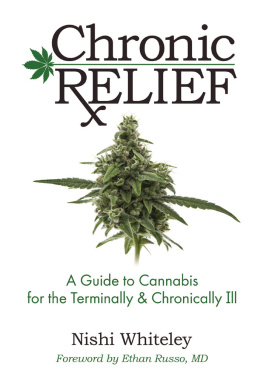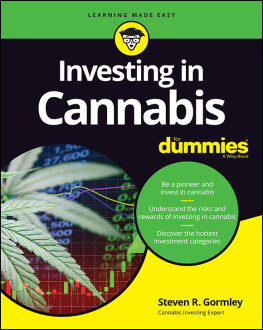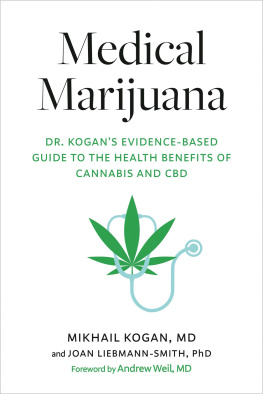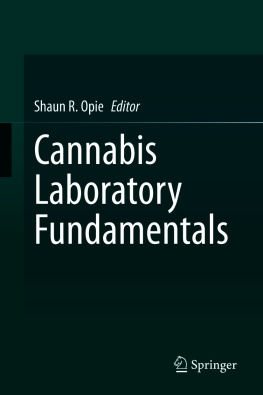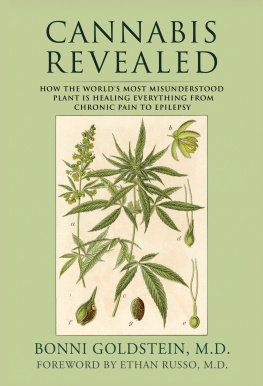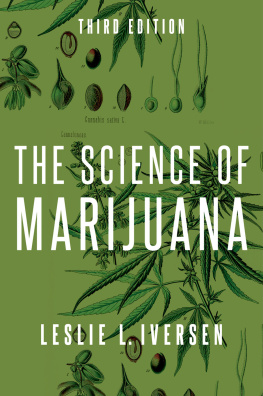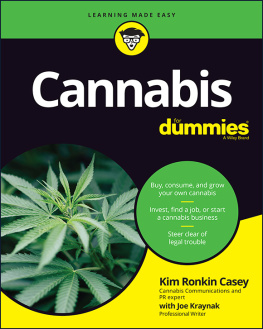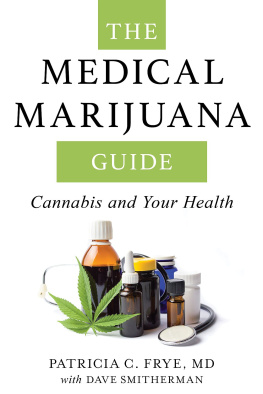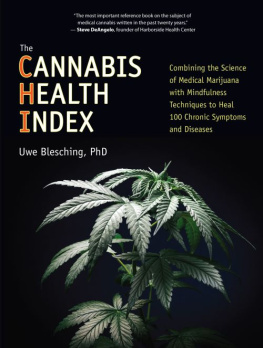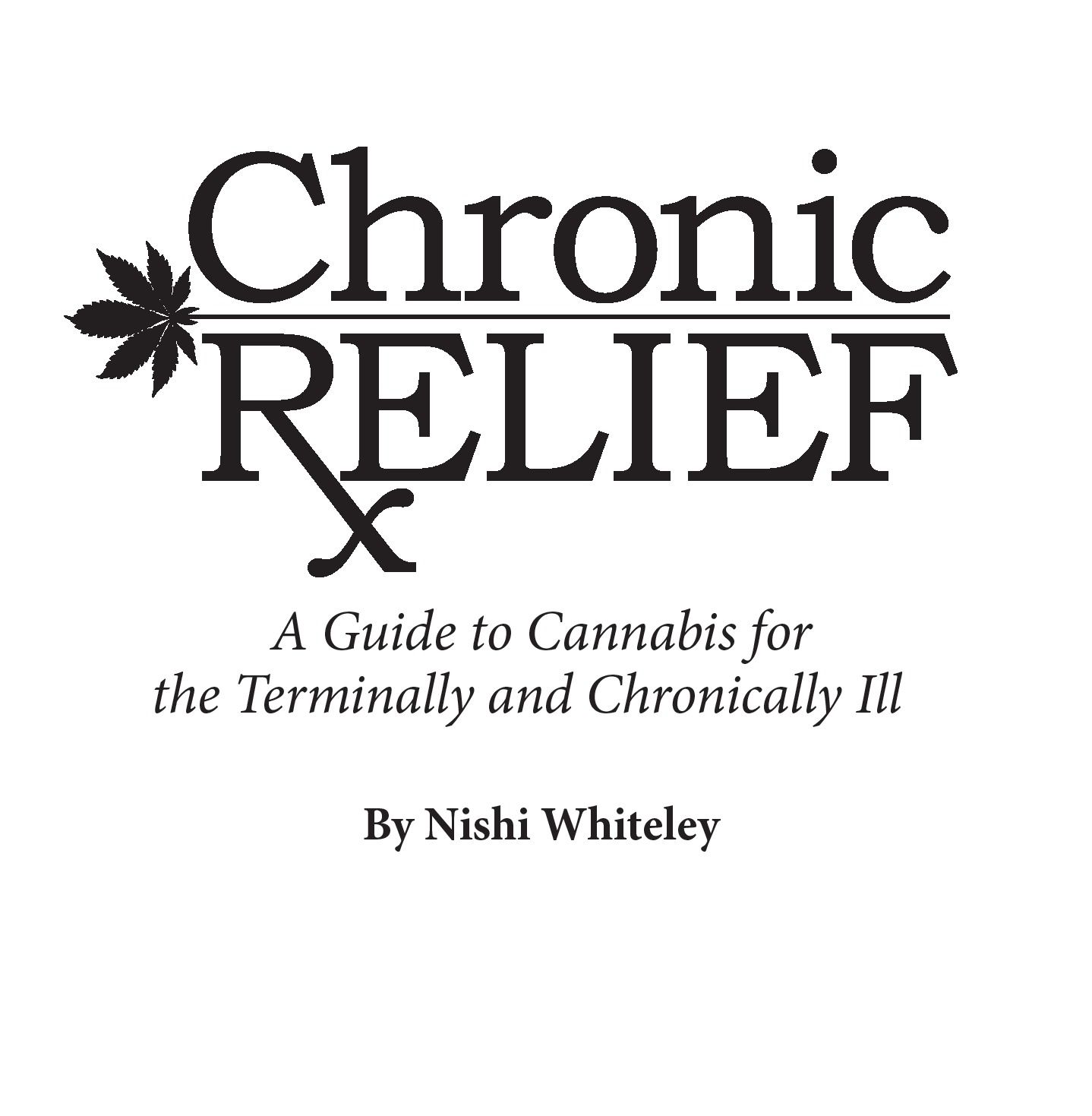
.
Disclaimer
The contents of this book, all text, graphics, images, tables, and studies are for informational purposes only. The content is not meant to be a substitute for professional medical advice, diagnosis, or treatment.
This book is written as an introductory guide to cannabis. You are urged to read all the referenced studies, books, websites, and videos to deepen your understanding of cannabis.
This information is not meant to prevent, alleviate, or cure any disease or disorder. Always seek the advice of a physician, doctor or chiropractor, or other qualified health provider with any questions you may have regarding a medical condition.
This information is not intended to promote the misuse of cannabis or any other drug. If you suspect you are abusing drugs, we urge you to seek professional medical help.
Neither the publisher nor the author shall be liable or responsible for any loss or damage allegedly arising from any information or suggestion within this book or on our website.
Chronic Relief: A Guide to Cannabis for the Terminally and Chronically Ill Author: Nishi Whiteley
Foreword: Ethan Russo, M.D.
Editors: Kurt Wilson and Anne Tara Szostek
Index: Theresa Raymond
Cover & Interior Design: Jeanette Dickens
Cover Photo: Mojave Richmond, Enhancements by Drew Rice
ISBN: 978-0-9971491-0-4
PCN/LCCN: 2016947106
Publisher: Alivio, LLC
Austin, Texas
Website: http://mychronicrelief.com
This book is dedicated to my parents,
James and Nadine Whiteley, for their
remarkable example of true love
in sickness and in health.
Contents
Chapter Two: Cannabis Introduction:
Is It Snake Oil or Real Medicine?
Foreword
by Ethan B. Russo, MD
C annabis has been documented as a medicinal plant for four thousand years or more, and between 1840 and 1940, enjoyed a century as a mainstream pharmaceutical throughout the civilized world. Its modern prohibition in the USA in the last 75 years is a historical aberration, a political decision despite the expressed testimony of the American Medical Association that it should remain in the pharmacopoeia. That ban was ruled unconstitutional by the US Supreme Court in 1969, only to be instituted once again in the following years despite the expressed scientific enquiry of the Shafer Commission that recommended its decriminalization and availability for medicinal use. Cannabis was last reviewed scientifically by the World Health Organization in 1965, just one year after the discovery of its primary psychoactive component, tetrahydrocannabinol, THC, with no subsequent follow-up despite the availability of decades of additional data. Although this plant is easily grown and provides a versatile fabric and extraordinarily nutritious seed, it has still been forbidden to cultivate or possess in most nations. It is often falsely claimed that there is no proof of medical benefit for cannabis. In truth, a 2011 assessment by the International Association for Cannabinoid Medicines yielded 34 pages of clinical trial study data and reports attesting to its efficacy and safety with no attributable major toxicity or mortality (http://www.cannabis-med.org/english/studies.pdf). The pejorative view of this plant has so poisoned political opinion that it has almost completely suppressed knowledge of the endocannabinoid system (ECS), a fundamental physiological system. That prejudice has ensured that the ECS is rarely covered in medical school curricula ostensibly merely because its name is based upon that very plant. Thus, another generation of physicians remains ignorant of a critical topic that portends to provide relief from medicines many recalcitrant disorders that beg for improved therapy. Patients around the world have decried denial of the availability of cannabis-based medicines as a violation of their most basic human rights to access its ability to provide palliation of their pain and suffering.
The discovery of the endocannabinoid system in the last decade of the 20th century has provided the rational basis for understanding the therapeutic value of cannabis and its components. The role of the ECS in modulating virtually every aspect of human physiology to maintain homeostatic balance explains the myriad claims that patients around the world have made in relation to cannabis as an analgesic, sleep-aid, anti-inflammatory agent, anti-nausea drug, anticonvulsant, gastrointestinal remedy, autoimmune disease palliative, anti-spasticity drug, primary chemotherapeutic agent in cancer, antidepressant, anti-anxiety and even antipsychotic. While the primary psychoactive chemical of cannabis, tetrahydro cannabinol (THC) is often vilified, fear of its adverse effects has been constantly exaggerated in perpetuation of a global political agenda based on an extremely shaky foundation anchored solely on ideology and a political agenda, rather than on science. Worse, it has impeded necessary research into cannabis therapeutics, especially regarding another key cannabinoid, the non-intoxicating cannabidiol (CBD), whose analgesic and anti-inflammatory activity complement those of THC, but which also counteracts many THC side effects such as anxiety and tachycardia.
Longer life spans and toxic exposures have both contributed to an epidemic of cancer in humans and our companion animals. The usual and customary approach to chemotherapy involves use of cytotoxic agents in the hope that they will kill all the cancer but not the patient nor their other critical organs and function. While therapeutic advances are clear with this approach, it remains a terrible ordeal for the affected patient, and one sometimes worse than the disease itself. Current research supports the promise of cannabinoids in treating cancer much more selectively, as these drugs are capable of targeting malignant cells, and diminishing their blood supply without corresponding damage to the surrounding normal tissues. To date, research on the cannabinoids has been slow to take hold in oncology because of intellectual property issues coupled with an irrational fear of the psychoactivity of THC and the plant from whence it came.
The prohibition of a fabulously therapeutic plant has denied a palliative and potentially curative healing agent to millions of people around the globe, and simultaneously criminalized and alienated countless people who deign to employ it for whatever reason. In doing so, it has also removed the hempen shirt from their back and nourishing hempseed from their mouths. The attempts to eradicate this prolific plant in a continuing culture war have poisoned the landscape, eliminated livelihoods, and pitted neighbor against neighbor. The costs to society have been astronomical, with no demonstrable gain. Instead a major crime against humanity and crime against nature have been perpetrated and perpetuated.
Contemporaneously, Sativex (USAN: nabiximols), an oromucosal whole cannabis-based medicine containing roughly equal proportions of THC and CBD as well as terpenoids is approved for treatment of spasticity in multiple sclerosis in 27 countries around the world, and is also approved for pain in MS and cancer pain unresponsive to optimized opioid treatment in Canada. Additionally, Epidiolex, a purified cannabidiol extract is currently in Phase III clinical trials in the intractable pediatric epilepsies, Dravet and Lennox-Gastaut syndromes, with a notable benefit. These medicines prove that properly constituted cannabis-based medicines can fulfil all the necessary requirements for safety, quality, consistency and efficacy required of any pharmaceutical. In so doing, they underscore that the prohibitions placed on cannabis are fatally flawed and deleterious to public health around the globe.
Next page
